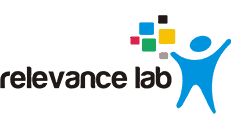2019 Blogs, Blog
Excerpts of the Relevance Lab’s Interview during ChefConf 2019 by MediaOps
ChefConf is a global gathering that allows the DevOps community to learn, share ideas, and network. By sharing real-world examples of how organizations solve problems to deliver business value, ChefConf is all about tactics, strategies, and insights for transformational application delivery organizations.
Relevance Lab was a Silver Sponsor at ChefConf 2019 in Seattle. As a strategic Chef Partner, Relevance Lab provides end-to-end Chef Factory solutions to deliver real business value to enterprises, helping them build automated, well-governed, secure, and industry-compliant cloud environments.
At the event, Pradeep Joshi, Senior Director of DevOps at Relevance Lab, was interviewed by Chris Riley of Digital Anarchist, an all-new video platform from the MediaOps family of brands. Pradeep spoke about Relevance Lab’s presence in the DevOps domain for the past eight years and the various services that the company offers.
As a Chef Partner for six years, and focused on DevOps automation, Relevance Lab offers services such as infrastructure automation, configuration management, and continuous deployment, among others. Pradeep explained how DevOps has transformed businesses over the years. Projects used to start with hardware procurement, move on to application capacity planning, and go around in cycles. Things move a lot faster now as hardware is much more affordable and the cloud offers servers in a matter of minutes. At the same time, the mindset of people and the culture of organizations have also changed. From senior management to lower-level employees, people have been more accepting of these changes.
Pradeep reaffirmed that automation is key to the success of organizations across the world. According to him, “what to automate” is a tougher decision to make than “how to automate”. For instance, when there are different teams (IT, software, applications, database, production support, etc.) working together, Excel sheets, emails, and chats among the groups could delay processes to a large extent. When there’s a need for faster deployment or when there are configuration changes for the production team, people are skeptical about how such tasks can be automated. Primitive and inefficient ways slow down processes, and this is an area where products like Chef help automate processes through code. Relevance Lab advises its clients that infrastructure, security, applications, and compliance should be code. All of this can be achieved with automation.
On being asked how the automation idea began for Relevance Lab’s clients, Pradeep said it all started with a problem statement. There is always a need or a problem to be solved, and Relevance Lab is keen on understanding the exact problem. Is shipping the applications a major issue? Is managing configurations more taxing? Is there a cultural block in the organization that makes employees resistant to change? It is natural for employees to feel some anxiety while moving to the cloud; they often feel it is not safe to put production data on the cloud. According to Pradeep, this mindset should change and evolve with frequent meetings, discussions, and constant mentoring. Employees need to understand the benefits of moving to the cloud; they should be more agile, be favorable to market changes, and eventually get used to the new ways of doing things.
With affordable infrastructure available at the click of a button, people should start thinking from an application point of view, such as: what does my application need for deployment? After procuring hardware and scripting automation, Pradeep says the next big change is going to be all about doing things more intelligently. In this regard, Relevance Lab has come up with a new framework called BOTs that enables automation of mundane tasks such as password reset, user creation/deletion, and data backup.
Pradeep concluded the discussion by emphasizing on the growing need to separate the tasks that need to be done by humans and those that can be automated. After all, automation allows an organization to get a lot more things done in a day, ultimately boosting efficiency and enhancing productivity.
(This blog is based on the video interview taken up during ChefConf 2019 by MediaOps and the link of the original video can be found here)
Click here to View Video Video Courtesy: Digital Anarchist